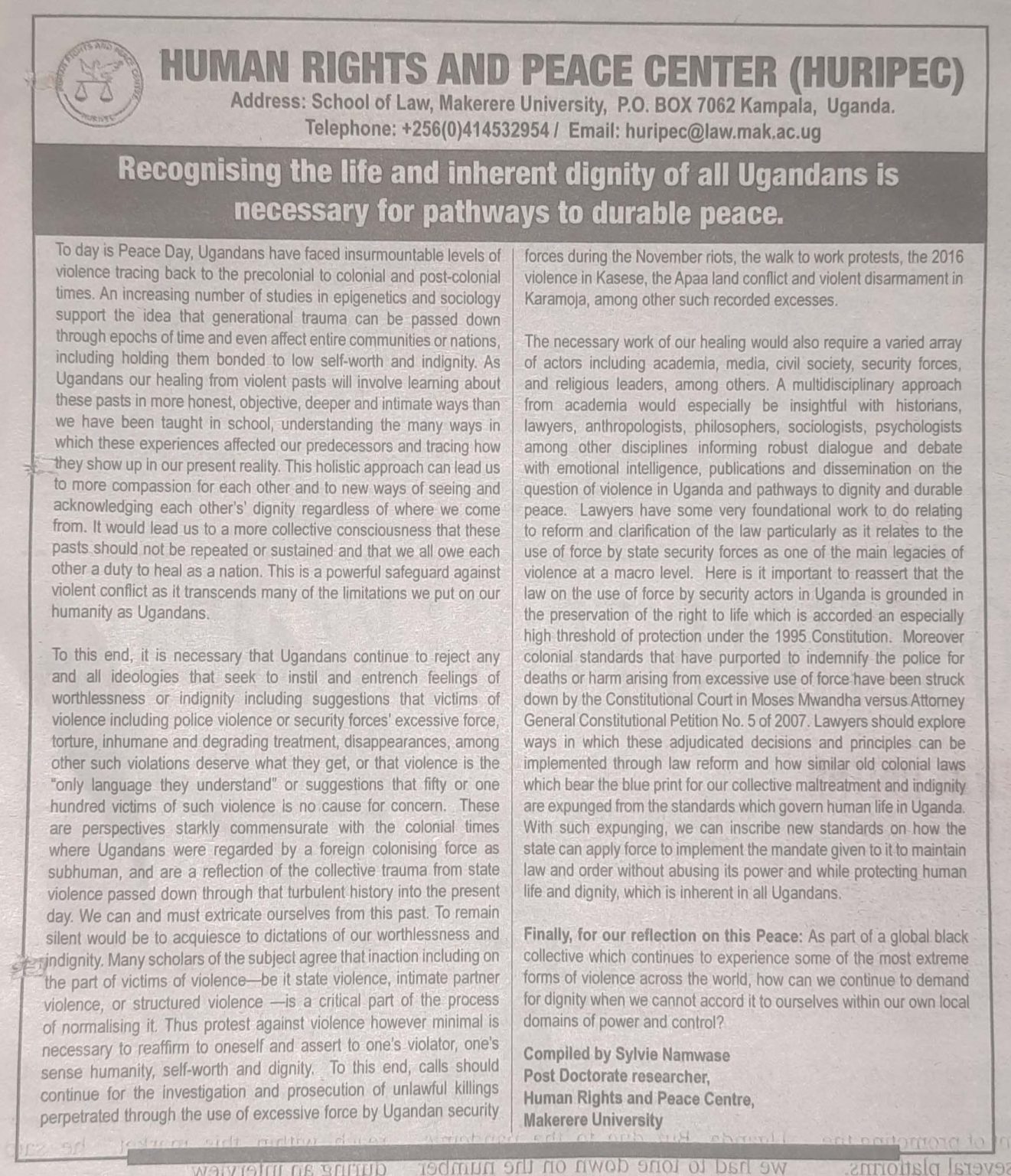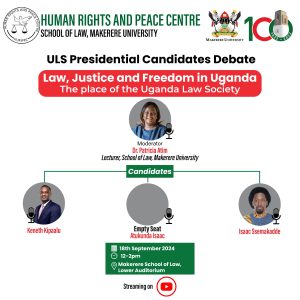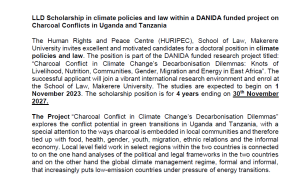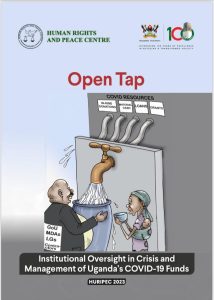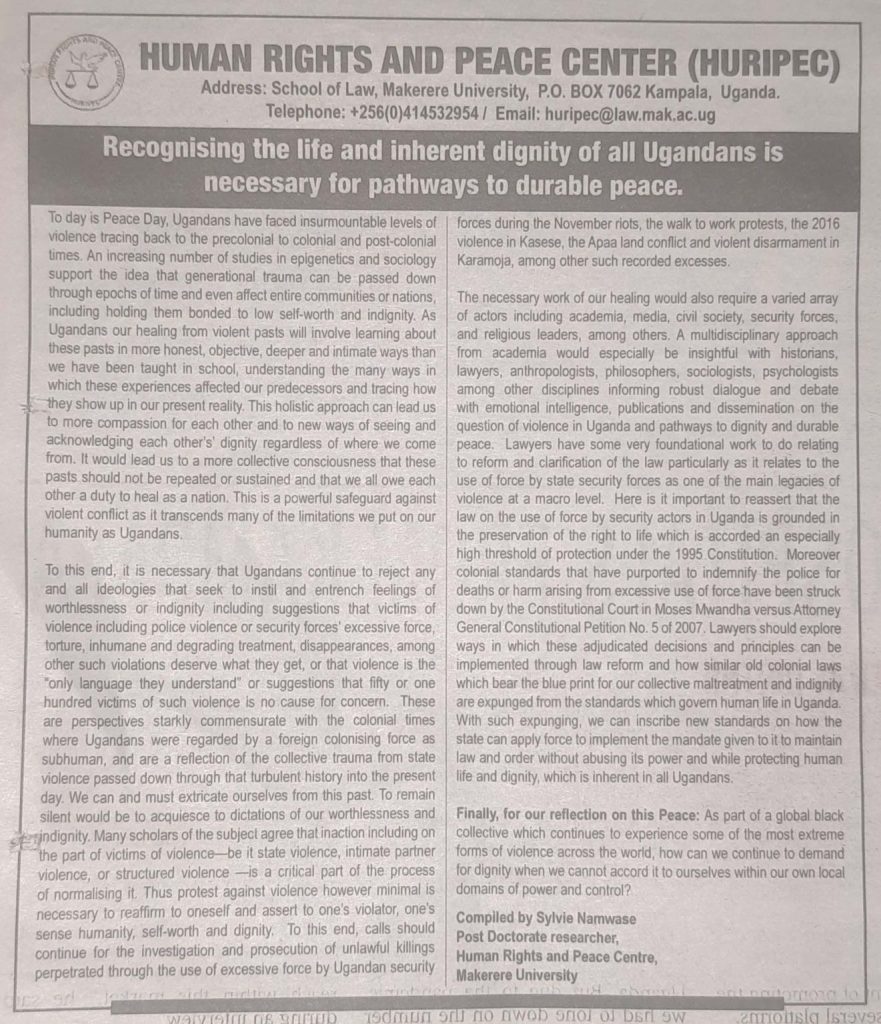 Yesterday (the 22nd September 2022) was the Peace Day. Ugandans have faced insurmountable levels of violence tracing back to the precolonial to colonial and post-colonial times. An increasing number of studies in epigenetics and sociology support the idea that generational trauma can be passed down through epochs of time and even affect entire communities or nations, including holding them bonded to low self-worth and indignity. As Ugandans our healing from violent pasts will involve leaming about these pasts in more honest, objective, deeper and intimate ways than we have been taught in school, understanding the many ways in which these experiences affected our predecessors and tracing how they show up in our present reality. This holistic approach can lead us to more compassion for each other and to new ways of seeing and acknowledging each other’s dignity regardless of where we come from. It would lead us to a more collective consciousness that these pasts should not be repeated or sustained and that we all owe each other a duty to heal as a nation. This is a powerful safeguard against violent conflict as it transcends many of the limitations we put on our humanity as Ugandans.
Yesterday (the 22nd September 2022) was the Peace Day. Ugandans have faced insurmountable levels of violence tracing back to the precolonial to colonial and post-colonial times. An increasing number of studies in epigenetics and sociology support the idea that generational trauma can be passed down through epochs of time and even affect entire communities or nations, including holding them bonded to low self-worth and indignity. As Ugandans our healing from violent pasts will involve leaming about these pasts in more honest, objective, deeper and intimate ways than we have been taught in school, understanding the many ways in which these experiences affected our predecessors and tracing how they show up in our present reality. This holistic approach can lead us to more compassion for each other and to new ways of seeing and acknowledging each other’s dignity regardless of where we come from. It would lead us to a more collective consciousness that these pasts should not be repeated or sustained and that we all owe each other a duty to heal as a nation. This is a powerful safeguard against violent conflict as it transcends many of the limitations we put on our humanity as Ugandans.
To this end, it is necessary that Ugandans continue to reject any and all ideologies that seek to instil and entrench feelings of worthlessness or indignity including suggestions that victims of violence including police violence or security forces’ excessive force, torture, inhumane and degrading treatment, disappearances, among other such violations deserve what they get, or that violence is the only language they understand” or suggestions that fifty or one hundred victims of such violence is no cause for concern. These are perspectives starkly commensurate with the colonial times where Ugandans were regarded by a foreign colonising force as subhuman, and are a reflection of the collective trauma from state violence passed down through that turbulent history into the present day We can and must extricate ourselves from this past. To remain silent would be to acquiesce to dictations of our worthlessness and indignity. Many scholars of the subject agree that inaction including on the part of victims of violence-be it state violence, intimate partner violence, or structured violence-is a critical part of the process of normalising it. Thus, protest against violence however minimal is necessary to reaffirm to oneself and assert to one’s violator, one’s sense humanity, self-worth and dignity, To this end, calls should continue for the investigation and prosecution of unlawful killings perpetrated through the use of excessive force by Ugandan security forces during the November riots, the walk to work protests, the 2016 violence in Kasese, the Apaa land conflict and violent disarmament in Karamoja, among other such recorded excesses.
The necessary work of our healing would also require a varied array of actors including academia, media, civil society, security forces and religious leaders, among others. A multidisciplinary approach from academia would especially be insightful with historians, lawyers, anthropologists, philosophers, sociologists, psychologists among other disciplines informing robust dialogue and debate with emotional intelligence, publications and dissemination on the question of violence in Uganda and pathways to dignity and durable peace. Lawyers have some very foundational work to do relating to reform and clarification of the law particularly as it relates to the use of force by state security forces as one of the main legacies of violence at a macro level. Here is it important to reassert that the law on the use of force by security actors in Uganda is grounded in the preservation of the right to life which is accorded an especially high threshold of protection under the 1995 Constitution. Moreover colonial standards that have purported to indemnify the police for deaths or harm arising from excessive use of force have been struck down by the Constitutional Court in Moses Mwandha versus Attorney General Constitutional Petition No. 5 of 2007 Lawyers should explore ways in which these adjudicated decisions and principles can be implemented through law reform and how similar old colonial laws which bear the blue print for our collective maltreatment and indignity are expunged from the standards which govern human life in Uganda With such expunging, we can inscribe new standards on how the state can apply force to implement the mandate given to it to maintain law and order without abusing its power and while protecting human life and dignity, which is inherent in all Ugandans.
Finally, for our reflection on this Peace: As part of a global black collective which continues to experience some of the most extreme forms of violence across the world, how can we continue to demand for dignity when we cannot accord it to ourselves within our own local domains of power and control?
Sylvie Namwase is a Post Doctorate researcher, at the Human Rights and Peace Centre (HURIPEC), Makerere University.
The above text was published in the New Vision on the 21st day of September 2022 to commemorate the Peace Day.

